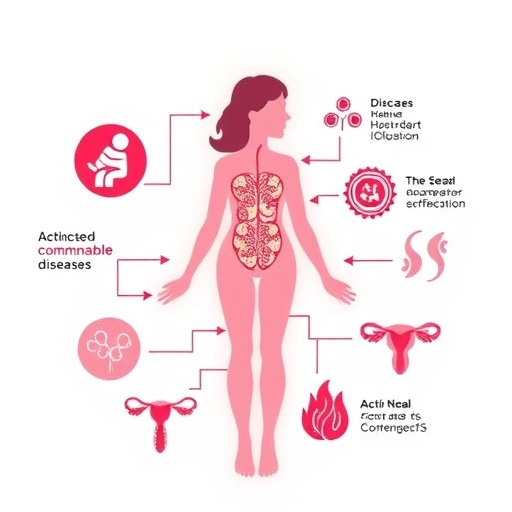Polycystic ovarian syndrome (PCOS) is gaining recognition as a significant risk factor for various non-communicable diseases. A recent study, led by researchers Naeem, Zehra, and Rehman, examines the intricate relationship between PCOS and the heightened susceptibility to chronic health conditions such as type 2 diabetes, cardiovascular diseases, and metabolic syndrome. This research offers critical insights into the prevention approaches that can mitigate these risks, thereby enhancing the quality of life for affected individuals.
The implications of PCOS extend far beyond reproductive health issues. Traditionally viewed primarily through the lens of infertility, this disorder not only disrupts menstrual cycles but also sets the stage for a myriad of metabolic complications. The study sheds light on the biochemical mechanisms underlying this correlation, elucidating how insulin resistance often accompanies PCOS, leading to an elevated risk for type 2 diabetes. This finding emphasizes the urgent need for comprehensive management strategies that prioritize healthy lifestyle changes alongside medical interventions.
Furthermore, cardiovascular health is notably compromised in women with PCOS. The study highlights an alarming association between PCOS and increased levels of inflammatory markers, such as C-reactive protein, and dyslipidemia, where levels of cholesterol and triglycerides become dangerously imbalanced. As these factors contribute cumulatively to cardiovascular diseases, the research calls for a proactive approach in monitoring heart health among women diagnosed with PCOS.
The hormonal imbalances characteristic of PCOS contribute to various psychological and emotional challenges, reinforcing the importance of a multi-faceted treatment approach. The study reports that depression and anxiety disorders are disproportionately higher among women with PCOS. Addressing these mental health concerns is not just complementary but essential in a holistic framework focused on improving overall health outcomes. Therapeutic interventions, should therefore encompass both psychological support and appropriate medical treatment.
In addition to insulin resistance and hormonal imbalances, the study draws attention to the increased likelihood of developing other conditions, such as sleep apnea and even endometrial cancer, in women with PCOS. The interconnected nature of these risks underscores the necessity of comprehensive education initiatives aimed at raising awareness about the potential long-term consequences of untreated PCOS. Such educational measures can empower women to seek early intervention and preventive care.
In light of these alarming findings, researchers advocate for personalized treatment plans that consider each woman’s unique health profile. These plans should ideally incorporate lifestyle modifications, including regular physical activity, a balanced diet rich in whole foods, and weight management strategies. The study importantly stresses that even modest weight loss can significantly improve insulin sensitivity and overall hormonal balance, highlighting a pathway toward better health.
Moreover, the role of regular health check-ups can’t be overstated. The research emphasizes the importance of routine screenings for glucose levels, lipid profiles, and other metabolic markers among women diagnosed with PCOS. Early detection of abnormal readings can prompt timely interventions that significantly reduce the risk of developing chronic diseases later in life.
Integrating technology in health management emerges as a pivotal theme in the research. The proliferation of wearable fitness trackers and health applications provides women with PCOS an opportunity to monitor key health parameters, garnering real-time insights into their well-being. These tools can serve to reinforce healthy behaviors and foster accountability, enhancing the overall effectiveness of their health management strategies.
Similarly, advancements in telemedicine are revolutionizing how healthcare is accessed and delivered. Women facing barriers such as geographic isolation or mobility issues can greatly benefit from virtual consultations, allowing for continuous medical follow-up and support. The flexibility offered by telemedicine can encourage women to engage actively in their health management, facilitating ongoing dialogue with healthcare providers.
The study ultimately emphasizes a collaborative approach to PCOS management, involving endocrinologists, gynecologists, dietitians, and mental health professionals. This multidisciplinary collaboration not only provides a comprehensive perspective on patient care but also cultivates a supportive environment that fosters healing and well-being.
As research progresses, the need for large-scale, long-term studies becomes apparent. Such studies are essential for understanding the full spectrum of health risks associated with PCOS and developing effective interventions. By accumulating data over time, researchers can refine prevention strategies and treatment protocols, significantly impacting public health policies and clinical practices.
In conclusion, the emerging evidence linking PCOS to an array of non-communicable diseases underscores an urgent call to action. Vigilance in monitoring, education around lifestyle changes, and availability of tailored interventions are imperative in combating the broader health implications of this syndrome. With continued research efforts and increased awareness, there lies a promising opportunity to transform the landscape of women’s health, ensuring that those affected by PCOS can lead healthier, more fulfilling lives.
Subject of Research: Polycystic ovarian syndrome (PCOS) as a risk factor for non-communicable diseases.
Article Title: Polycystic ovarian syndrome a risk factor for non-communicable diseases: insights into recent research and prevention approaches.
Article References:
Naeem, I., Zehra, A., Rehman, F. et al. Polycystic ovarian syndrome a risk factor for non-communicable diseases: insights into recent research and prevention approaches.
J Ovarian Res 18, 219 (2025). https://doi.org/10.1186/s13048-025-01741-z
Image Credits: AI Generated
DOI: 10.1186/s13048-025-01741-z
Keywords: PCOS, non-communicable diseases, insulin resistance, cardiovascular health, lifestyle modification, mental health, telemedicine, women’s health.




